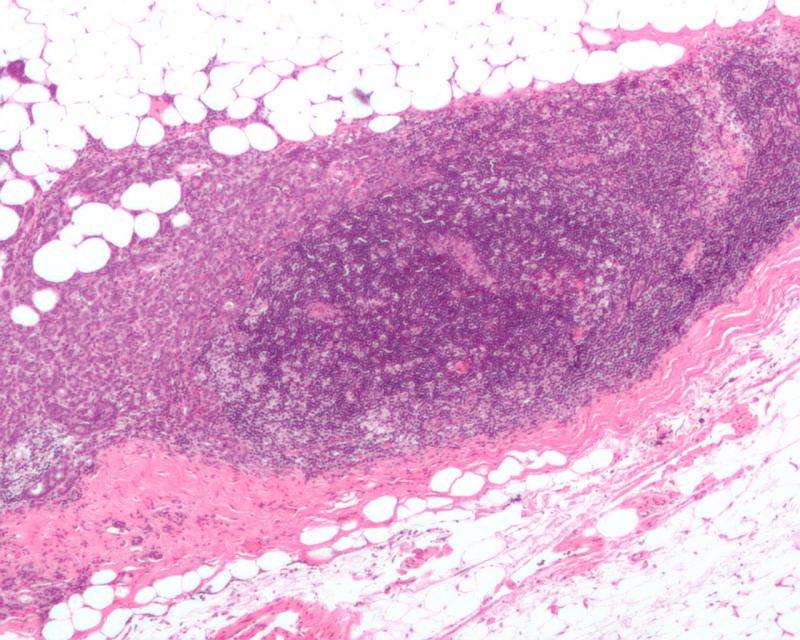Delaying chemotherapy in breast cancer patients reduces overall survival

Postponing the start of adjuvant chemotherapy for more than 90 days following surgery may significantly increase risk of death for breast cancer patients, particularly those with triple-negative breast cancer (TNBC), according to a new study from The University of Texas MD Anderson Cancer Center. Further, the researchers found that factors such as socio-economic status, insurance coverage and ethnicity were associated with delayed treatment.
According to the study, published in JAMA Oncology, patients who start chemotherapy more than 90 days after surgery are 34 percent more likely to die within five years. Patients with TNBC who delay treatment have a 53 percent increased risk of death.
Adjuvant chemotherapy, which is given after primary surgery, has been demonstrated to benefit patients by decreasing the risk of recurrence and death, explained Mariana Chavez Mac Gregor, M.D., assistant professor, Health Services Research and Breast Medical Oncology. However, delaying the start of adjuvant chemotherapy may allow small remnants of the tumor to grow or become drug-resistant.
Currently, there are no guidelines recommending the optimal time to initiation of adjuvant chemotherapy. The Centers for Medicare & Medicaid Services (CMS) considers the administration of adjuvant chemotherapy within 120 days of diagnosis for certain patients as a quality metric. Eleven cancer hospitals, including MD Anderson, are now reporting on this metric.
Past studies have suggested that delaying the initiation of therapy could result in adverse patient outcomes, but the optimal timing for starting adjuvant therapy has not been defined. To clarify this time frame relative to modern treatments and identify factors contributing to delayed treatment, the researchers analyzed data from the California Cancer Registry.
This population-based study examined data from 24,823 patients with Stage I to III invasive breast cancer diagnosed between January 1, 2005 and December 31, 2010 and treated with adjuvant chemotherapy. This is the largest study investigating the effects of delayed chemotherapy initiation with contemporary treatment regimens.
"Compared to patients starting chemotherapy in the first month after surgery, we observed that those who initiated chemotherapy between 30 and 90 days following surgery did not have adverse outcomes," said Chavez Mac Gregor, lead author of the study. "However, starting chemotherapy more than 90 days after surgery was associated with a statistically significant increase in the risk of death and breast cancer-specific death."
Those patients who started chemotherapy more than 90 days after surgery, represented by 9.8 percent of those included in the study, were 34 percent more likely to die within five years and 27 percent more likely to die from breast cancer in that time frame compared to patients who had surgery within 30 days from surgery.
As the data also included information on breast cancer subtype, the researchers analyzed whether delayed chemotherapy had a differential effect according to disease subtype. For patients with TNBC, a delay of more than 90 days was associated with a 53 percent increase in the risk of death. There was no significant effect from delay for those with hormone-receptor-positive or HER2-positive breast cancers.
"These data suggest that timely initiation of chemotherapy is particularly important among patients with triple-negative breast cancer," said senior author Sharon Giordano, M.D., professor and chair, Health Services Research and professor, Breast Medical Oncology.
This study also sought to determine factors contributing to delayed administration of chemotherapy in order to identify patient groups in need of improved care delivery. While patients with later stage disease and TNBC were less likely to experience delays, increased age, reconstructive surgery and certain socio-demographic factors were associated with postponed treatment.
"We observed, not surprisingly, that socio-demographic factors determined, in great part, some of this delay. Patients with low socio-economic status (SES), those without private insurance and those of Hispanic or African-American descent were more likely to have delays in their treatment," said Chavez Mac Gregor.
Worse overall survival was also associated with patients of African-American descent, lower SES and those with Medicare and Medicaid coverage. In contrast, those patients receiving care at National Cancer Institute-designated cancer centers had a 34 percent lower risk of death compared to those who were treated elsewhere.
"We need to identify the determinants of delays in treatment so we can act on them and potentially improve the delivery of care in vulnerable populations. In most clinical scenarios, administering chemotherapy within three months is more than feasible," said Chavez Mac Gregor.
The results of the current study support including time to chemotherapy initiation as a quality metric, and additionally suggest that treatment should begin within 90 days of surgery, explained Chavez Mac Gregor.
While the authors acknowledge the study may be limited by its retrospective nature, they conclude that all breast cancer patients receiving adjuvant chemotherapy should do so within 90 days of surgery or 120 days of diagnosis.
"We need to start chemotherapy in a timely manner," said Chavez Mac Gregor. "In those patients who want to delay their chemotherapy, I share this data and let them know that a delay can dilute the benefits of treatment. If at all possible, we should not delay."
More information:
JAMA Oncol. Published online December 10, 2015. DOI: 10.1001/jamaoncol.2015.3856
JAMA Oncol. Published online December 10, 2015. DOI: 10.1001/jamaoncol.2015.4508















